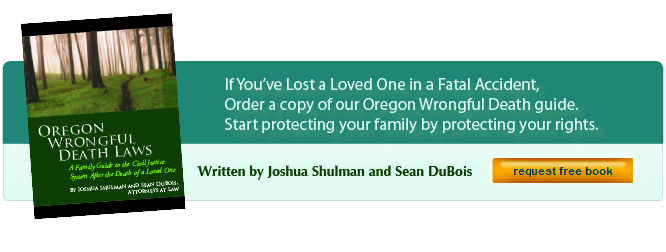Oregon Accident Attorneys’ Glossary of Legal Terms
Action: Usually refers to a legal action or filing of a lawsuit, which begins the judicial process leading either to a dismissal, award, or settlement of the action, by Portland personal injury lawyers or other individuals.
Affidavit: A written statement affirmed or sworn by oath before a commissioner or a notary public for use as evidence in court. In Oregon we now often use Declarations instead.
Age of Majority: The age when a person acquires all the rights and responsibilities of being an adult. In Oregon, as in most states, the age is 18.
Allegation: Something that someone says happened, often stated by a plaintiff in the form of a complaint, or asserted by a “bad driver” as a response to the plaintiff’s complaint.
Alternative Dispute Resolution: Methods for resolving problems without going to court, such as mediation and arbitration, for which Oregon Accident Attorneys are trained.
Answer: The defendant’s written response to the plaintiff’s complaint.
Attorney Fee: The compensation a lawyer receives for legal services performed, in or out of court; can be an hourly rate, a flat rate, or a contingency fee. Most personal injury lawyers work on a contingency fee basis.
Breach of Warranty: When a retailer or manufacturer fails to follow through with a promise or claim about a product.
Civil Lawsuit: A lawsuit in which one does not need to prove criminal liability. In a criminal lawsuit, the State is trying to put someone in jail for breaking a law. In a civil lawsuit, an injured person is trying to get compensation for his or her injuries.
Compensation: The monetary award transferred from defendant to plaintiff to make up for some wrong, damage, or injury caused by the defendant’s actions or inaction, usually after Portland personal injury attorneys have negotiated to reach a settlement or gone to trial.
Contingency Fee: Most lawyers are paid hourly, and the range is usually $150/hr all the way up to $500/hr or more. But with a “contingent fee,” you pay the Portland personal injury lawyers nothing up front. There is no hourly fee. Instead, you pay the lawyer a percentage (usually 33% to 40%) of all money that the lawyer can get for you. If the lawyer cannot get you any money, you don’t have to pay the lawyer’s fees at all.
Crashworthiness: The measure of how well a vehicle withstands a crash. If a vehicle does not meet required standards, the faulty design can result in injury to occupant during a crash, and therefore a lawsuit for not meeting those standards.
Damages: Has two different meanings. “Damages” can refer to the amount of money you have lost and the suffering you have undergone as a result of your injury. How much you have been damaged. And “Damages” also refers to the amount of money you get to compensate you.
Deposition: After a lawsuit is filed, the lawyer for either party may require the other party or independent witnesses to come to the lawyer’s office and submit to a “deposition” under oath. The lawyer will ask the “deponent” (the person being questioned) questions about the case, to which the deponent must give a response. A court reporter will be present and write down all questions and answers. At trial, the lawyer might introduce the questions and answers into evidence, perhaps to show that a witness has changed his story from the story he told at the deposition.
Discovery: After a lawsuit is filed, each party is allowed to obtain information in the possession of the opposing party. This process is called “discovery.” Discovery devices include the deposition, requests for admission, interrogatories (in Federal Court only; not allowed in Oregon State Court), and requests for documents.
Ex Parte: A legal proceeding in which only one side appears in court. Ex parte proceedings are usually allowed only when immediate action is necessary and there is not enough time to allow the other side to respond. And usually, despite this definition, the side that is appearing does actually have to give the other side notice.
Fiduciary: A person who is legally and ethically obligated to advance the interests of the other person over his or her own interests. This term is usually associated with the type of duty a trustee owes to a beneficiary, and it is the duty a lawyer owes to his or her client.
Interrogatories: After a lawsuit is filed, either party may seek to “discover” information from the other party. One of the discovery devices is “written interrogatories,” which ask the other party certain questions that must be answered in writing and is under penalty of perjury. These answers may be used against that party at trial. In Oregon, interrogatories are only allowed in Federal Court, not in State Court.
Law of the Case: If a judge makes a ruling on a legal issue during a case, it becomes the standard in that case and becomes binding throughout the life of that particular case.
Loss of Consortium: A legal claim for compensation for the loss of a marital or family relationship, usually in the form of love, companionship, community, and comfort.
Medical Malpractice: Improper or negligent treatment of a person under a medical professional’s care, which results in harm.
Misrepresentation: False advertising, especially when ads claim that a product is safer than it truly is.
Negligence: Failure to exercise a reasonable degree of care, resulting in an unintended injury to another party.
Nursing Home Abuse: Any physical, sexual, verbal, psychological, or financial abuse perpetrated against residents of a residential care facility. Although nursing home abuse is a growing problem, many victims do not report violations because they are scared or ashamed.
Opinion: The legal reasoning relied upon by the court in rendering a judgment or decision on the matter before the court. Appellate opinions that are published are considered to be law and will serve as legal precedent for future cases.
Personal Injury Damages: Losses for which the law allows compensation. In personal injury cases this includes economic and non-economic damages, and sometimes punitive damages. In most cases in Oregon, as Portland personal injury lawyers know, punitive damages are rare – and the state takes 60% of punitive damages in taxes anyway.
Preponderance of Evidence: What the plaintiff’s burden is in a personal injury claim. Generally, this means proof, by more than 50%, that the defendant was legally responsible for an injury.
Product Liability: Law that holds manufacturers, wholesalers, and retailers responsible for the safety and quality of their products.
Punitive Damages: Money that is sought not to compensate the injured person, but to punish the wrongdoer. In Oregon, a person is not allowed to even ask for punitive damages until a judge has approved. And if a person gets punitive damages, the State of Oregon keeps 60% of it. The person then usually pays 20% to her lawyer, and then has to pay income tax on the remainder. This is why there are very few punitive damages verdicts in Oregon.
Rebuttal: Argument made in response to the other side’s argument.
Request for Admissions: As part of the “discovery” process, either party to a lawsuit may serve on the other party written requests to admit certain facts, in order to save time at trial. Admissions will then be admitted into evidence at the trial.
Request for Production of Documents: As part of the “discovery” process, either party to a lawsuit may serve on the other party a written request for production of specified documents, such as medical records, driving history, insurance policies, photographs, repair records.
Rules of Evidence: Lawyers are not allowed to just say whatever they want at trial. Portland personal injury lawyers are limited by the rules of evidence to saying only things that are legally admissible. In theory, this is based on fairness, and on disallowing arguments that are based on emotion rather than facts. The rules of evidence guide admissibility of evidence.
Settlement: An agreement between two sides to end the case, usually by the defendant paying some money to the person who was harmed. The settlement can be in a lump sum or it can structure into payments over a period of time by a third party.
Statute of Limitations: A law limiting the length of time a potential plaintiff has to file a lawsuit. These statutes vary depending on circumstances. In Oregon, they can be as short as 180 days in some cases.
Strict Liability: This holds manufacturers responsible for the goods they produce, especially if they cause consumers injury.
Structured Settlement: An agreement in which one party agrees to pay the other a sum of money usually in the form of periodic payments over a period of time, as opposed to a lump sum payment. Property and casualty insurance companies often purchase life insurance products to pay the costs of such settlements.
Summary Judgment: A motion during litigation and prior to trial, where one party asks the court to rule in its favor based upon facts that are undisputed.
Tort: Any action or failure to act that wrongs, damages, or injures or harms another, and thus forms the basis of a civil lawsuit.
Wrongful Death: A death that occurs because of someone else’s malice, negligence, or recklessness.
 Fewer Cases Better Results
Fewer Cases Better Results 





